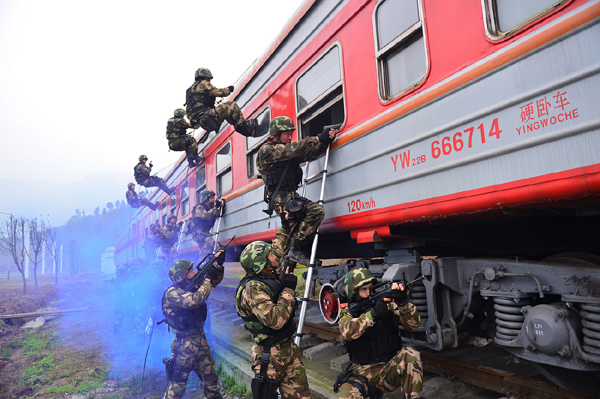Taking the fight to the terrorists
Updated: 2015-03-14 10:10
By Cui Jia, Zhang Yi and Zhang Yan(China Daily)
|
||||||||
China's lawmakers are putting the final touches on new, unprecedented legislation aimed at preventing attacks, identifying and apprehending suspects, and protecting vulnerable communities, as Cui Jia, Zhang Yi and Zhang Yan report.
It wasn't until terrorists targeted the very heart of Beijing in 2013 that many Chinese citizens realized the true nature of the threat and its close proximity.
At noon on Oct 28, six people died and 39 were injured when a jeep was deliberately driven into a crowd and burst into flames at Tian'anmen Square. Three of the dead were tourists, and the others were the occupants of the jeep.
The East Turkestan Islamic Movement, a group that has been designated a terrorist organization by the United States, China, Saudi Arabia and other countries, claimed responsibility for the attack, and it warned of similar incidents to come.
The attack, which caused widespread shock in China and overseas, also accelerated the process of drafting the country's first anti-terrorist legislation, which is expected to be passed into law soon, according to legal experts.
The international impact of the attack was also significant because it sent out a strong signal that the terrorists' sphere of activity has spread outside the Xinjiang Uygur autonomous region in Northwest China, the traditional battleground of China's war on terrorism, said Liu Renwen, a criminal expert at the Chinese Academy of Social Sciences.
Liu said he began to see the flaws in China's approach to the fight against terrorism, such as the lack of a legal definition of terrorism, in the wake of the attacks in the United States on Sept 11, 2001.
Xinjiang, home to 52 percent of China's Muslims, has recently witnessed a marked rise in the number of terrorist attacks, a phenomenon attributed to the influence of aggressive religious extremists and separatist groups.
"The attacks at Tian'anmen Square and elsewhere made the lawmakers understand the urgency of enacting comprehensive anti-terrorism laws to address the worsening situation, instead of simply amending the current Criminal Law to fight terrorism," said Liu, who gave his views on the first draft of the proposed law to the National People's Congress, the country's top legislative body.
In fact, the NPC began conducting research into the feasibility of introducing anti-terrorism legislation in every administrative region in August 2011, with the aim of countering the increasingly serious threat.
After three years of legal research and public consultation, the first draft of the law was brought to the table in August, and has now undergone two readings and amendments by the Standing Committee of the NPC.

 Push for Lunar New Year school holiday
Push for Lunar New Year school holiday
 Bruce Lee's legacy promotes Kungfu in LatAm
Bruce Lee's legacy promotes Kungfu in LatAm
 Germany's Black Forest: a popular holiday destination
Germany's Black Forest: a popular holiday destination
 Sea of color at Shenzhen race
Sea of color at Shenzhen race
 Taking the fight to the terrorists
Taking the fight to the terrorists
 Historical images of 'two sessions'
Historical images of 'two sessions'
 How expats celebrated Chinese Spring Festival in 2015
How expats celebrated Chinese Spring Festival in 2015
 Sacred craft dwindles
Sacred craft dwindles
Most Viewed
Editor's Picks

|

|

|

|

|

|
Today's Top News
Li: Mutual respect, interests key to US relations
US targets vocational schools in visa crackdown
Washington pitched to tourist
Confucius 2.0: Role in China reprised
Foreign investment restrictions
to be cut
Taking the fight to the terrorists
China: Action to be taken if deadly bombing happens again
New bureau set to boost graft fight
US Weekly

|

|








